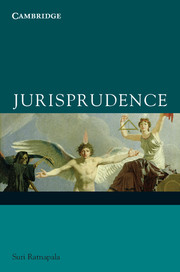Book contents
- Frontmatter
- Contents
- Acknowledgements
- List of Figures
- 1 Introduction
- PART 1 LAW AS IT IS
- 2 British Legal Positivism
- 3 Germanic Legal Positivism: Hans Kelsen's Quest for the Pure Theory of Law
- 4 Realism in Legal Theory
- PART 2 LAW AND MORALITY
- PART 3 SOCIAL DIMENSIONS OF LAW
- PART 4 RIGHTS AND JUSTICE
- References
- Index
3 - Germanic Legal Positivism: Hans Kelsen's Quest for the Pure Theory of Law
from PART 1 - LAW AS IT IS
- Frontmatter
- Contents
- Acknowledgements
- List of Figures
- 1 Introduction
- PART 1 LAW AS IT IS
- 2 British Legal Positivism
- 3 Germanic Legal Positivism: Hans Kelsen's Quest for the Pure Theory of Law
- 4 Realism in Legal Theory
- PART 2 LAW AND MORALITY
- PART 3 SOCIAL DIMENSIONS OF LAW
- PART 4 RIGHTS AND JUSTICE
- References
- Index
Summary
British legal positivism was founded on empiricism. Empiricist legal theorists reject metaphysical or mystical explanations of law and assert that law exists as social fact and nothing more. The main inspiration for Germanic legal positivism is not empiricism but the transcendental idealism of the German philosopher Immanuel Kant (1724–1804). Whereas British legal positivists regard law as fact distinct from morals, their Germanic counterparts seek to separate law from both fact and morals. This chapter discusses Germanic legal positivism principally through the work of its most famous proponent, Austrian legal philosopher Hans Kelsen.
Kelsen (1881–1973) was born in Prague but moved with his family to Vienna at the age of two. He taught at the universities in Vienna and Cologne and at the University of California at Berkeley. Kelsen was the author of the Austrian Constitution and the designer of the Austrian model of judicial review adopted by many countries.
The key elements of Kelsen's theory are these. Facts consist of things and events in the physical world. Facts are about what there is. When we wish to know what caused a fact we look for another fact. A stone thrown in the air comes down because of the force of Earth's gravity. There are seasons because the Earth's axis is tilted at 23.5 degrees. A norm, unlike a fact, is not about what there is but is about what ought to be done or not done. Whereas facts exist in the physical world, norms exist in the world of ideas.
- Type
- Chapter
- Information
- Jurisprudence , pp. 58 - 92Publisher: Cambridge University PressPrint publication year: 2009

